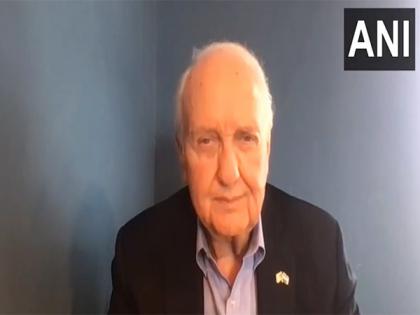"It'll be mutually beneficial," former US official on trade negotiation with India; warns Trump administration on "bullying approach"
By ANI | Updated: May 30, 2025 04:13 IST2025-05-30T04:06:01+5:302025-05-30T04:13:05+5:30
South Carolina [US], May 30 : Former US Assistant Secretary of Commerce for Trade Development, Ray Vickery on Thursday ...

"It'll be mutually beneficial," former US official on trade negotiation with India; warns Trump administration on "bullying approach"
South Carolina [US], May 30 : Former US Assistant Secretary of Commerce for Trade Development, Ray Vickery on Thursday [local time] said that a trade agreement between India and US will be mutually beneficial if they will be able to lower tariffs but warned Donald Trump administration over its "bullying approach" of reciprocal tariffs.
Speaking to ANI, Vickery said, "It'll be mutually beneficial to be able to lower tariff and non-tariff barriers. In Trump, 1.0, there was a negotiation which came close to getting a freer trade, not a free trade arrangement between the United States and India. One hopes that that would happen, but it's not going to happen with this bullying approach, which the Trump administration has indicated, or indeed this so-called reciprocal tariff across the Board."
A US team is scheduled to visit India on June 5-6 for the next round of negotiations on the Bilateral Trade Agreement (BTA) between both countries.
Additionally, Union Minister of Commerce and Industry Piyush Goyal has suggested that the talks for a bilateral trade agreement (BTA) with the United States are on track.
Vickery also spoke withon Donald Trump's repeated claims of brokering cessation of hostilities between India and Pakistan and said that the Trump administration wants to "take credit for anything that it considers to be favourable to them."
"The Trump administration wants to take credit for anything that it considers to be favourable to them, to President Trump, and a win. I have no doubt that the role of the United States in that ceasefire has been exaggerated. Indeed, the Indian government has indicated as much by not giving the kind of credit to President Trump and his administration that is being claimed," he said.
Donald Trump has made repeated claims that the US offered both countries "a lot of trade" to put an end to the conflict, which started after the Pahalgam terror attack. India destroyed nine terror infrastructure sites in Pakistan and Pakistan-occupied Jammu and Kashmir under Operation Sindoor.
Vickery suggested that it is unfair to economic relations as a "bullying tactic" for cessation of hostilities, and lauded India for keeping the emphasis on international terrorism
"There is no question in my mind that security and economic considerations are intimately connected. That doesn't mean you use, as President Trump has indicated, Economic relations as a bullying tactic for a ceasefire between India and Pakistan, or for any other reason, but they are related in terms of how nations ultimately treat each other. In the case of the ceasefire, I think India is quite right in keeping the emphasis on international terrorism," he said.
India has emphasised that the militaries of the two nations negotiated directly and resolved the conflict through an agreement and understanding for a cessation of fire and military action.
Additionally, Vickery expressed concerns about the ongoing threat of terrorism on the Indian subcontinent. In his statement, Vickery highlighted the need for a coordinated and strong approach to tackle terrorism in the region.
"In the past few years, we've kind of put aside the threat of international terrorism because it has been dampened down. But the incident of Pahalgam and the murder of 26 Indians and one Nepali citizen on a religious basis shows that terrorism, unfortunately, is alive and well on the Indian subcontinent, and it takes a very coordinated and strong approach to be able to do so." Vickery said.
Vickery also commented on the role of the United States in the region, particularly in relation to Pakistan. "Did the United States and, particularly, Secretary Rubio, provide an off-ramp for Pakistan? Yes. I think that they did," he stated.
The former official emphasized the importance of working closely with India to combat international terrorism. "There is an interest across the board and what it takes is working with India on a sustained basis, not a hyphenated basis, not looking at Pakistan and India, some sort of equivalences in the equation, but working with India particularly to be able to damp down international terrorism and that sometimes requires harsh measures," he said.
Vickery drew parallels with the experiences of the United States in Afghanistan and Israel in Gaza, stating that a "generalised war approach" to eliminating radical Islamic terrorism is ineffective. "The United States experience, particularly in Afghanistan, and the Israeli experience in Gaza show that the generalised war approach to damping down or eliminating radical Islamic terrorism does not work," he said.
Disclaimer: This post has been auto-published from an agency feed without any modifications to the text and has not been reviewed by an editor
Open in app